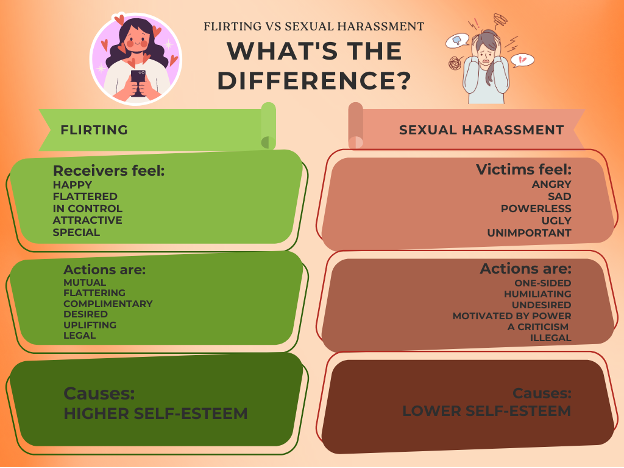Sexual Harassment Prevention & Protection
UWI, Mona - Zero Tolerance
The University of the West Indies (The UWI) is an equal opportunity institution. Accordingly, sexual harassment, an aspect of gender discrimination and of violence, is expressly prohibited and will not be tolerated. The UWI is committed to ensuring and maintaining a safe and healthy educational and work environment which is free from sexual harassment.
The UWI will reflect this policy of non-tolerance of sexual harassment in the oversight of its students, employees, persons under its independent service arrangements, other persons who provide academic services to The University, as well as to its contractual agreements, independent service arrangements and its interaction with members of the public.
Three Sexual Harassment Prevention Tips
Legal Framework
The government of Jamaica passed into law on the October 1, 2021, The Sexual Harassment Prevention & Protection Act, 2021. The ACT took effect July 3, 2023 and requires that all organisations submit to the Bureau of Gender Affairs in the Ministry of Culture, Gender, Entertainment & Sport, their Policy and Procedures in keeping with the stipulated guidelines and in accordance with the 2021 ACT. Part II Section 4 of the ACT states,
Every employer shall:
- in relation to the business or undertaking of the employer, issue a policy statement in writing concerning the prevention of sexual harassment in the business or undertaking and the protection of the workers in the business or undertaking from sexual harassment; and
- take such steps as are reasonably required to bring the policy statement to the attention of the workers employed by the employer,
What is Sexual Harassment?
According to the Sexual Harassment (Protection and Prevention) Act (2021), sexual harassment is defined as "any conduct or behavior that constitutes unwanted and unwelcome conduct of a sexual nature by one person toward another".
Types of Sexual Harassment
Sexual harassment can take many forms — both verbal and non-verbal. Here are the main types:
-
Physical: Unwanted touching, hugging, kissing, groping, etc.

-
Verbal: Offensive comments about appearance, sexual jokes, insults based on sex. "Compliments" can also be harassment.

-
Non-verbal: Suggestive gestures, winks, leering.

-
Psychological: Intimidation, persistent unwanted advances, sexual innuendo.

-
Cyber: Sharing sexual content or sending explicit messages via online platforms.

-
Written/Visual: Distributing pornography or written sexual content.

-
Quid Pro Quo: Trading sexual favors for job benefits or public services.

-
Stalking: Obsessive following, contact, and watching someone, either physically or online.

-
Voyeurism: Spying on someone in a private space without their knowledge.

Remember, acts or comments of a sexual nature, not intended to harass, can constitute sexual harassment if another person feels uncomfortable with such subjects. Claiming to not understand or failing to know that an act is harassing, does not mean that it is not in fact, sexual harassment.
Reporting Procedures
A sexual harassment complaint may be initiated via telephone, in-person (i.e., drop in/by appointment) or via a third party (a person who is not directly involved with the sexual advance being reported). All sexual harassment complaints will be treated confidentially. The procedures for each of these avenues are outlined in the Trauma – informed sexual harassment complaints protocol. Communication about an incident of sexual harassment at the UWI, Mona can take several forms:
- Queries - means questions about any matter that relates to sexual harassment and its prevention
- Third-party Reports - reports of a sexual harassment incident made by someone other than the person involved
- Informal Reports - all third party reports are informal reports. Other informal reports may be made by the person involved but does not contain the name of the person and therefore cannot be escalated beyond recording the report and any action that may be deemed necessary.
- Formal Complaints - formal complaints must be made to the Sexual Harassment Complaints Unit (SHCU) and must contain the name and contact information of the complainant as well as the respondent.
- Claims - Claims are considered legal procedures, taken up with the Tribunal in the Bureau of Gender Affairs (BGA). Any complainant may simultaneously report a claim to the BGA while also reporting the complaint internally to the UWI, Mona Sexual Harassment Complaints Unit. Complainants are advised by the Act to exhaust internal processes before approaching the Tribunal or satisfy the Tribunal that their case may not be heard without prejudice by the UWI, Mona.
Filing Sexual Harassment Complaints
Any member of the University Community may make an allegation of sexual harassment through your Student Sexual Harassment Peer Advisor (SSHPA), Faculty Sexual Harassment Focal Point (SHFP) or the Sexual Harassment Complaints Coordinator (SHCC) in the Office of the Campus Registrar. We are all available to assist you in making a confidential complaint.
Every Faculty has Staff Sexual Harassment Focal Points and Student Peer Advisors. Their role is to:
- serve as the point of contact for members of staff and students who have complainant/respondents
- refer complainants/respondents to the Sexual Harassment Complaints Coordinator in the Office of the Campus Registrar
- attend training sessions to be current with the requirements of the UWI Policy & Procedures and the 2021 ACT
Note your respective Faculty Focal Points and Student Peer Advisors.
The quick steps are outlined below:
Note** All reports are kept confidential.
- Complaint received by Sexual Harassment Complaints Coordinator; through Student Peer Advisor; Staff Focal Point; email; walk-in; Telephone: 876-927-1660-9 ext. 7606
- Sexual Harassment Complaints Coordinator informs complainant of the informal & formal procedures for staff & students. Respondent advised of the nature of the complaint within 2 working days. Psychosocial support is offered.
- Complaint is escalated, or mediated. All reports are anonymised and recorded.
- Formal complaints that are escalated and deemed to require disciplinary action are reported to the Principal through the Campus Registrar.
Note** An allegation of sexual harassment may be filed within six years of the occurrence of the alleged incident of sexual harassment.
False Sexual Harassment Complaints
A person who knowingly makes a false sexual harassment complaint to The University may be subject to disciplinary proceedings in accordance with established University procedures for staff and student misconduct.
Additionally, under section 27 of the 2021 act, a person who knowingly makes a false complaint before the Bureau of Gender Affairs Tribunal commits an offence.
“A person who contravenes subsection (1) commits an offence and shall, on summary conviction in a Parish Court, be liable to a fine not exceeding one million dollars or, in default of payment thereof, to imprisonment for a term not exceeding three months” (The Sexual Harassment Protection & Prevention Act, 2021).
Important Contacts
- Sexual Harassment Complaints Coordinator - Office of the Campus Registrar
Email: reportsexualharassment@uwimona.edu.jm - UWI Health Centre Tel: 876-927-2520/876-970-0017
Email: healthservs@uwimona.edu.jm - Campus Security, UWI, Mona Tel: 876-292-6686
Some Key Terms You Should Know
- Abuse of power - the improper use of a position of influence, power or authority against another person, including actions that create an intimidating, offensive or a hostile living, working, or academic environment
- Consensual relationship – a romantic and/or intimate and/or sexual involvement based on a mutual agreement of both parties.
- Conciliation – the settlement of the issue usually after the complainant and respondent have undergone mediation.
- Complainant – a person who alleges that she/he has been sexually harassed by making a sexual harassment allegation or complaint to The University of the West Indies through established procedures.
- Consultation - the process by which an individual may seek clarification or advice on matters pertaining to sexual harassment.
- False representation – report or statement made with the knowledge that it is untrue.
- Mediation – a confidential and voluntary process aimed at arriving at a mutually agreed settlement at which the parties are facilitated by a person certified for this purpose, whether from the University or externally.
- Member of the University Community means any person who is employed by The University of the West Indies as academic staff, non-academic staff, or who provides academic services to The University of the West-Indies, and any person who is a registered student of The University of the West Indies, or who is entitled to be so registered, but whose registration is pending and, for the purposes of this Policy, includes any person who has been awarded a degree by, or otherwise left The University of the West Indies during the previous six years of lodging a sexual harassment complaint.
- Mentoring – the process by which a person who has been involved in an incident of sexual harassment is given individual guidance/supervision/direction and ongoing education with respect to issues relating to sexual harassment.
- Power - can be defined in a general way as “the ability to act or produce an effect,” as well as more specifically, the “possession of control, authority or influence over others” (Merriam–Webster online dictionary, 2009). The capacity to act or influence others to act in a certain way (Oxford Dictionary of Organizational Behaviour, 2019) Respondent – a person whose alleged conduct is the subject of a sexual harassment complaint.
- Retaliation – any action taken by a respondent, or any other person not connected to the sexual harassment complaint, against a complainant or third party to penalise the latter (complainant and/or third party) for participating in any process related to the pursuit of a sexual harassment complaint.
- Sexual advance - includes any one or more of the following acts, forms of conduct or behaviour, namely— (a) physical contact of a sexual nature; (b) a demand or request for sex or for favours of a sexual nature; (c) the making of sexual suggestions, remarks or innuendos; (d) the showing of pornography or the display of images or objects of a sexual nature; and (e) any other physical, gestural, verbal, non-verbal or visual conduct of a sexual nature.



